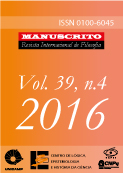Resumen
In this paper, I propose a variant of a Humean account of laws called "Open Future Humeanism" (OFH), which holds that since the laws supervene partly on future events, there are at any instant infinitely many possible future courses of events. I argue that if one wants to take the openness of the future that OFH proposes ontologically serious, then OFH is best represented within a growing block view of time. I further discuss some of OFH’s problems which stem from the fact that in this view, there are no laws as long as time progresses. These problems can be solved by adding a temporal operator to the laws, so that at any instant, we get a set of tensed laws which held up to and including that instant.Citas
Armstrong, D. M. What is a Law of Nature? Cambridge University Press, Cambridge, 1983.
Backmann, M. Humean Libertarianism – A Revisionist Account on the Joint Problem of Free Will, Determinism, and Laws of Nature. ontos, Heusenstamm/Frankfurt, 2013.
Beebee, H. Necessary connections and the problem of induction. Noûs, 45(3):504–527, 2011.
Beebee, H. and Mele A. Humean compatibilism. Mind, 111:201–223, 2002.
Bird, A. The dispositionalist conception of laws. Foundations od Science, 10(4):353–370, 2005.
Braddon-Mitchell, D. How do we know it is now now? Analysis, 64: 199–203, 2004.
Braddon-Mitchell, D. Fighting the zombie of the growing salami. In Karen Bennett and Dean W. Zimmerman, editors, Oxford Studies in Metaphysics, volume 8, pages 351–361. Oxford University Press, 2013.
Briggs R. and Graeme A. Forbes. The real truth about the unreal future. In Karen Bennett and Dean W. Zimmerman, editors, Oxford Studies in Metaphysics, volume 7, pages 257–304. Oxford University Press, Oxford, 2012.
Dunbar Broad, C. Scientific Thought. Harcourt, Brace and Co., New York, 1923.
Correia, F. and Rosenkranz, S. Living on the brink, or welcome back, growing block! In Karen Bennett and Dean W. Zimmerman, editors, Oxford Studies in Metaphysics, volume 8, pages 333–350. Oxford University Press, 2013.
Earman, J. Reassessing the prospects for a growing block model of the universe. International Studies in the Philosophy of Science, 22(2): 135–164, 2008.
Earman, J. and Roberts, J. Contact with the nomic: A challenge for deniers of Humean supervenience about laws of nature, Part i: Humean supervenience. Philosophy and Phenomenological Research, LXXI(1): 1–22, 2005.
Graeme A. Forbes. The growing block’s past problems. Philosophical Studies, 173:699–709, 2016.
Hüttemann, A. Scientific practice and necessary connections. Theoria (Spain), 79:29–39, 2014.
Lewis, D. Philosophical Papers, volume II. Oxford University Press, Oxford, 1986.
Lewis, D. Humean supervenience debugged. Mind, 103:475–490, 1994.
Łukasiewicz, J. On determinism. In Stors McCall, editor, Polish Logic 1920-1939, pages 19–39. Oxford University Press, Oxford/New York, 1967.
Ramsey, F. P. General propositions and causality. In David H. Mellor, editor, F.P. Ramsey: Philosophical Papers. Cambridge University Press, Cambridge, 1990 (1929).
Stalnaker, R. C. A theory of conditionals. Americal Philosophical Quarterly, 2:98–112, 1968.
Swartz, N. The Concept of Physical Law. Cambridge University Press, second edition, 2003.
Tooley, M. Time, Tense, and Causation. Oxford University Press, Oxford, 1997.

